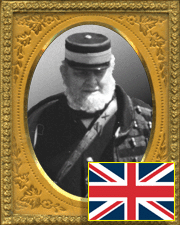
Military Observer's
Journal
 |
A Military Observer's Journal |
|
Military Observer’s Journal
In this day of super-spies, the Central Intelligence Agency, and rigid security restrictions, it is difficult to conceive of the elementary nature of military intelligence in the 1860's. Field Marshal Sir John Burgoyne, Inspector General of Fortifications of the British Army, corresponded frankly with his counterparts in Belgium, Russia and the United States about recent technical developments. He apparently felt no reluctance in asking Brigadier General Joseph G. Totten, Chief of Engineers in the Union Army, to provide a British observer with a plan of:
"...a fort or part of one, showing your most modern improved system of construction, application of materials, interior arrangements for the convenience and efficiency of the service, etc., in short, a good understanding of the progress in the service and art of military engineering that your countrymen are so likely to have produced at this eventful period of the general introduction of rifle guns, armour plating, etc."
As Sir John candidly admitted:
"After all, though we are bound to respect the desires of those whom we visit, you and I, General, know very well that for any sinister object we might have, we can obtain all that is most important by cursory view as ordinary passers by, and by open ordinary conversation; and on that principle, as well as for the duty of being courteous to strangers, I have myself constantly advocated the opening of all our sources of military engineering to all the world."
To the officer in question, Lieutenant Colonel T.L. Gallwey, Sir John gave the following instructions:
"Your object will be to study rather general systems and principles such as are usually considered open to the world, and in which nations take a pride in offering their improvements to other; and to avoid prying into any details in which the authorities desire to maintain any degree of mystery or reserve. You will make all the authorities fully acquainted with your course of proceedings and researches, courting from them all details and particulars that you desire, but dropping at once, and bona fide, any to which they shall offer objection; that is as far as distinct researches are concerned, for of course you are not to shut your eyes to what passes under ordinary observation. You will be able to show by a free offer of communicating to the officers of the United States Army all the information regarding the practices of our service, which we so unreservedly willing to afford to foreigners, your reasons for not considering the extent of you inquiries unreasonable."2
The orders of the officer of Royal Artillery who accompanied Gallwey reveal a similar attitude:
"You will bear in mind that a I though you are sent to the United States for a specific purpose, you do not go in any strictly official character. You will prosecute your inquiries quite openly, asking freely for information that you may feel would be interesting in a scientific or professional point of view, and which you believe is of a character that would not be kept secret in England from any officer accredited by a friendly nation. In any case where your demand shall be met with hesitation or refusal, you will at once abstain from any further inquiries in that direction, relinquishing any attempt to investigate points which the authorities may show a wish to conceal."3
1 Lieutenant Col. The Hon. George Wrottesley, Life and Correspondence of FIGID Marshall Sir John Burgoyne, Bdrt.(London,1873), II, 412-13.
2 Lieutenant Colonel T.L. Gallwey and Captain H.J. Alderson, Report upon the Military Affairs of the United States of America (London: War Office, 1864), page 76.
3 Ibid p. 75
Note: The above comments and references are taken from the following publication:
Jay Luvaas, The Military Legacy of the Civil War: The European Inheritance, The University
Press of Kansas, (Lawrence, Kansas-1988), Pages 9-10.
© 1999, James Mathews, all rights reserved. Contact Mr Mathews for permision to reproduce.
Return to the main Société d'Europe page
Return to the table of contents for "A Military Observer's
Journal"
Links to web sites related to this topic:
Society Web Page for James Mathews
The Adventures of Ian McKay